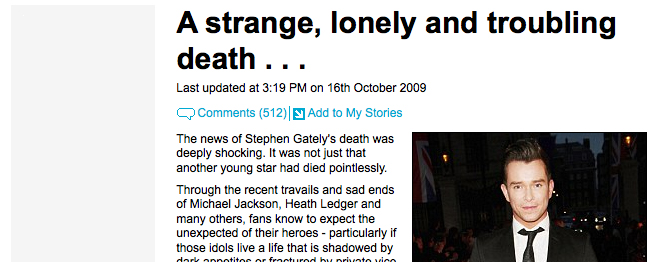Jan Moir is the latest ‘victim’ of the virtual mob. Last Friday after her ill-judged article in the Daily Mail cast doubt on the natural death of Boyzone’s singer Stephen Gately in Majorca, using a tone widely-perceived as homophobic, the blogosphere went mad seeking revenge.
Two thousand joined a Facebook group within hours, hundreds wrote to the Press Complaints Commission, inspired and pointed there on Twitter by Stephen Fry and Derren Brown.
The PCC was bounced into contacting Boyzone’s PR company to see if it wanted to complain. The Mail pulled ads on its website. BBC mentioned the Mail article in its news bulletins on Gately’s funeral.
Moir was forced to eat crow the very same day as publication and issued a statement of correction/clarification (you take your pick), claiming complaints against her Daily Mail article were mischievously ‘orchestrated’.
In response, HelpMeInvestigate.com, the crowd-sourced journalism site in beta, has launched an investigation into the nature of the campaign: just how ‘organised’ was the #janmoir / Jan Moir campaign, it asks.
So how democratic are these manifestations of the virtual mob?
The political and social pressure on broadcasters and other media brought about by the internet and ad hoc Facebook groups in particular is double edged.
It can lead to interactivity and enrichment but it can also lead to bullying by keystroke. The zenith of that was the Jonathan Ross/Russell Brand row in the autumn of 2008 but nowadays broadcasters, especially the BBC, are facing ‘crowd pressure’ from internet groups set up for or against a cause or a programme; they are an internet ‘flash mob. With the emphasis, maybe, on the ‘mob’.
When Jonathan Ross and Russell Brand rang up the veteran actor Andrew Sachs on October 18 2008 and were disgustingly obscene to him about his grand-daughter, that led to a huge public row on ‘taste,’ mainly stoked by the Daily Mail and the Mail on Sunday.
Fuel was added to the fire through comments by the Prime Minister. The ‘prosecuting’ virtual group was the editorial staff of the Mail newspapers and its millions of readers in Middle England. In support of the ‘Naughty Two’, more than 85,000 people joined Facebook support groups. Many, perhaps most, had never heard the ‘offensive’ programme. Just two had complained after the first broadcast.
The BBC was forced after a public caning to back down, the director-general yanked back from a family holiday to publicly apologise, Brand and his controller resigned and Ross was suspended from radio and television for three months. The virtual mob smelt blood: it got it.
The battleground for this mass virtual protest had been set out over the transmission of the programme ‘Jerry Springer; the Opera’ in January 2005. Fifty five thousand Christians petitioned the BBC to pull it from the schedules because of its profanity and alleged blasphemy. They engaged in modern guerilla warfare tactics to try to achieve their aim. Senior BBC executives had to change their home phone numbers to avoid that pressure. That campaign did not get a ‘result’. If Facebook had been in full flow then, the 55,000 may well have been 555,000 and the result very different.
This row set out the stall and template for the ‘popular virtual’ activism that culminated in Ross/Brand in 2008 and other cases since. In the good old days, ‘stormovers’ – as the brave founding father of Channel Four Sir Jeremy Isaacs called them – were conducted slowly and in green ink. He survived many such ‘storms’. Today the storms straddle the world in minutes and are just a keystroke or several score of them away from going nuclear.
This is activism by the click. It needs no commitment apart from signing up on a computer. It gives the illusion of democracy and belonging to a movement whereas in reality is it membership of a mob, albeit a virtual one? Is this healthy for democracy and media accountability or not?
Discuss. Online.
John Mair is a senior lecturer in broadcasting at Coventry University. He is a former BBC, ITV and Channel Four producer. Additional research by Peter Woodbridge from Coventry University.
